Energy costs will rise by more than expected for millions of British households this autumn after the price cap for a typical annual dual-fuel bill increased by 2% to £1,755.
The energy regulator for Great Britain, Ofgem, will raise the cap on gas and electricity charges from October by the equivalent of just over £35 a year for the average home as colder weather sets in.
The increase is in part because of an expansion of the government’s warm home discount scheme, which is expected to add about £15 to a typical bill while providing an extra 2.7 million households with a £150 reduction in their bills, according to analysts at Cornwall Insight, an energy consultancy.
About 9 million households who buy their energy through variable tariffs will see an immediate impact on their bills when the cap takes effect in October. Households could face even higher bills if they use more than the typical amount of energy.
This is because the cap, which is recalculated every three months, limits the rate energy suppliers can charge customers for each unit of gas and electricity – not the total bill.
The price of electricity will rise from 25.73p per kilowatt-hour over the summer to 26.35p a kWh from October under the price cap, while the price of gas will fall to 6.29p a kWh, from 6.33p a kWh over the summer, to reflect the modest falls in wholesale market prices.
Standing charges will rise, too, to help cover the costs of maintaining and upgrading Great Britain’s energy networks. The electricity standing charge will rise from 51.37p a day to a rate of 53.68p, while the standing charge for gas will rise from 29.82p per kWh to 34.03.
Responding to the price cap announcement, the Labour party blamed high bills on the previous government’s policies towards renewable energy and attacked the Reform leader Nigel Farage’s plans to turn away from greener energy sources.
“Energy bills soared under the Conservatives because they tied our country to the fossil fuel rollercoaster and working people are still paying the price,” a spokesperson said.
“From banning onshore wind to failing to deliver new nuclear, their reckless decisions left Britain exposed to wholesale gas prices that are still 75% higher than before Putin’s invasion of Ukraine.
“That’s why Nigel Farage’s unpatriotic war on clean energy would be a total disaster for families, businesses and our economy. His destructive plans would push bills higher, kill nearly a million jobs and scrap billions of pounds of vital investment across the country that will strengthen our energy security.
“This Labour government’s plan for change is protecting consumers, with 3 million more families getting £150 off their bills through the warm home discount, a total of 6 million in all, as we continue to invest in clean homegrown power to bring energy bills down for good.”
skip past newsletter promotion
Sign up to Business Today
Get set for the working day – we’ll point you to all the business news and analysis you need every morning
Privacy Notice: Newsletters may contain info about charities, online ads, and content funded by outside parties. For more information see our Privacy Policy. We use Google reCaptcha to protect our website and the Google Privacy Policy and Terms of Service apply.
after newsletter promotion
The higher-than-expected increase in the average dual-fuel price cap follows a brief reprieve from rising energy bills over the summer, when the energy price cap fell by 7% to £1,720 from July because of lower market prices.
The return to rising energy bills means the typical household will pay about £600 a year more on its annual bill than before Russia’s invasion of Ukraine in 2022 caused gas market prices to soar.
The rising price cap is likely to reignite the debate over the affordability of the UK’s energy as households look ahead to winter.
Official figures show that household energy debts reached a record high of £4.15bn at the end of last winter. The total debt and arrears figure has accelerated in the past two years even as energy bills have stabilised relative to the record increase in 2022.
Cornwall Insight has predicted that the price cap will fall slightly in January, depending on weather patterns, on whether geopolitics affects market prices and on whether new policy costs, such as those to support investment in new nuclear generating capacity, are added to bills.
